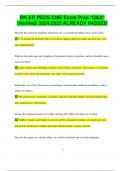RN ATI PEDS CMS Exam Prep *Q&A*
|Verified| 2024/2025 ALREADY PASSED
Describe the typical development milestones for a 12-month-old child in gross motor skills.
A 12-month-old should be able to sit without support, pull up to stand, and may take a few
steps independently.
What are the main signs and symptoms of respiratory distress in infants, and how should a nurse
assess for these?
Signs include rapid breathing, grunting, nasal flaring, retractions, and cyanosis. Assessment
should involve observing respiratory rate, effort, and oxygen saturation.
Explain the role of the school nurse in managing chronic health conditions in children, such as
asthma or diabetes.
The school nurse coordinates care plans, educates staff and students, monitors health status,
and communicates with families.
Discuss the nutritional needs of a toddler and how they differ from those of an infant.
Toddlers require a diet higher in calories and fat compared to infants, who need more iron
and protein. Portions are smaller, and meals should include a variety of foods.
Describe the impact of a chronic illness on a child's emotional and social development.
1
, Chronic illness can lead to feelings of isolation, anxiety, and low self-esteem, impacting
relationships with peers and the ability to participate in normal activities.
What are the key components of a well-child visit, and why are they important?
Key components include growth measurements, developmental screenings, immunizations,
and health education, important for early detection of issues.
Explain the process and importance of administering immunizations in childhood.
Immunizations protect against various infectious diseases, and the process involves
following the recommended schedule to ensure optimal immunity.
Describe the symptoms and management of a child experiencing a febrile seizure.
Symptoms include convulsions, loss of consciousness, and stiffening of the body.
Management includes ensuring safety, monitoring, and potentially administering antipyretics.
Discuss the psychosocial aspects of caring for a child with a terminal illness and how they affect
the family.
Families may experience grief, anxiety, and changes in family dynamics. Providing
emotional support and counseling is crucial.
Explain how to properly assess pain in a non-verbal child and the tools that can be used.
Pain can be assessed using behavioral observation, FLACC scale, or facial expression tools,
noting changes in activity, mood, and response to stimuli.
2
,Describe the typical signs of dehydration in children and the appropriate nursing interventions.
Signs include dry mouth, decreased urine output, lethargy, and sunken fontanels.
Interventions include oral rehydration and monitoring fluid status.
What are the key teaching points for parents regarding the introduction of solid foods to infants?
Introduce one food at a time, wait a few days before trying another, and avoid honey until
age 1 due to botulism risk.
Discuss the importance of cultural competence in pediatric nursing and its impact on patient
care.
Cultural competence enhances communication, builds trust, and improves health outcomes
by respecting diverse backgrounds and practices.
Explain the common causes and management strategies for failure to thrive in infants.
Causes include inadequate caloric intake, malabsorption, and neglect. Management involves
nutritional assessments and family education.
Describe the stages of Piaget’s cognitive development theory as they relate to childhood.
Piaget’s stages include sensorimotor (0-2 years), preoperational (2-7 years), concrete
operational (7-11 years), and formal operational (12 years and up).
3
, What are the typical emotional responses of children to hospitalization, and how can nurses help
alleviate their fears?
Children may feel fear, anxiety, or anger. Nurses can provide reassurance, clear explanations,
and engage in play therapy.
Discuss the importance of early intervention for developmental delays in children and the
potential outcomes.
Early intervention can improve developmental outcomes and quality of life by providing
support and resources for families.
Explain the nursing considerations when administering medication to pediatric patients.
Consider weight-based dosing, the child's developmental stage, potential side effects, and
ensure proper administration techniques.
Describe the common complications associated with chickenpox and how they should be
managed.
Complications can include bacterial skin infections and pneumonia. Management involves
monitoring symptoms and administering antivirals if indicated.
What are the best practices for promoting oral health in young children?
Best practices include regular dental check-ups, teaching proper brushing techniques, and
reducing sugary snack intake.
4




